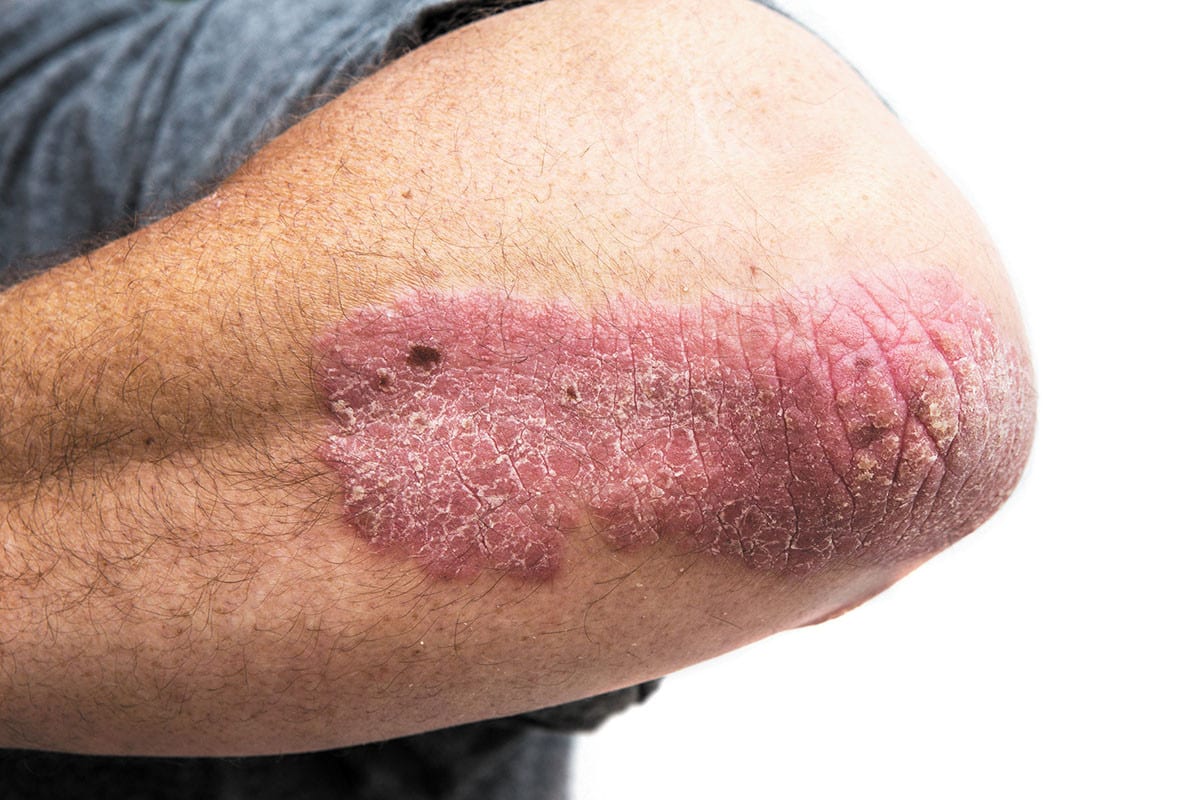About Psoriasis:
- It is a chronic autoimmune condition that causes the rapid buildup of skin cells. This buildup of cells causes scaling on your skin’s surface.
- It causes a rash with itchy, scaly patches, most commonly on the knees, elbows, trunk and scalp.
- It is a common, long-term (chronic) disease with no cure.
- It can be painful, interfere with sleep and make it hard to concentrate.
- The condition tends to go through cycles, flaring for a few weeks or months, then subsiding for a while.
- It is not contagious.
- Causes:
- An over-reactive immune system that creates inflammation in your skin causes psoriasis.
- If you have psoriasis, your immune system is supposed to destroy foreign invaders, like bacteria, to keep you healthy and prevent you from getting sick. Instead, your immune system can mistake healthy cells for foreign invaders.
- As a result, your immune system creates inflammation or swelling, which you see on the surface of your skin as skin plaques.
- Common signs and symptoms of psoriasis include:
- raised, inflamed patches of skin that appear red on light skin and brown or purple on dark skin;
- whitish-silver scales or plaques on the red patches or grey scales on purple and brown patches;
- dry skin that may crack and bleed;
- soreness around patches;
- itching and burning sensations around patches;
- thick, pitted nails;
- painful, swollen joints;
- Treatment: It has no cure. Treatments aim to
- reduce inflammation and scales;
- slow the growth of skin cells;
- remove plaques;
- Common psoriasis treatments include:
- Steroid creams.
- Moisturizers for dry skin.
- Medication to slow skin cell production (anthralin).
- Medicated lotions or shampoos.
- Vitamin D3 ointment.
- Vitamin A or retinoid creams.
Q1) What is an autoimmune condition?
An autoimmune condition, also known as an autoimmune disease, is a medical condition in which the body’s immune system mistakenly attacks its own healthy cells and tissues. Normally, the immune system’s primary function is to defend the body against harmful invaders such as viruses, bacteria, and other pathogens. However, in autoimmune diseases, the immune system becomes dysfunctional and targets the body’s own cells, leading to inflammation, tissue damage, and a range of symptoms.
Source: Psoriasis Awareness Month: How to manage psoriasis in children
Last updated on February, 2026
→ UPSC Notification 2026 is now out on the official website at upsconline.nic.in.
→ UPSC IFoS Notification 2026 is now out on the official website at upsconline.nic.in.
→ UPSC Calendar 2026 has been released.
→ UPSC Final Result 2025 is expected to be released in the second week of April 2026.
→ Check out the latest UPSC Syllabus 2026 here.
→ Join Vajiram & Ravi’s Interview Guidance Programme for expert help to crack your final UPSC stage.
→ UPSC Mains Result 2025 is now out.
→ UPSC Prelims 2026 will be conducted on 24th May, 2026 & UPSC Mains 2026 will be conducted on 21st August 2026.
→ The UPSC Selection Process is of 3 stages-Prelims, Mains and Interview.
→ Prepare effectively with Vajiram & Ravi’s UPSC Prelims Test Series 2026 featuring full-length mock tests, detailed solutions, and performance analysis.
→ Enroll in Vajiram & Ravi’s UPSC Mains Test Series 2026 for structured answer writing practice, expert evaluation, and exam-oriented feedback.
→ Join Vajiram & Ravi’s Best UPSC Mentorship Program for personalized guidance, strategy planning, and one-to-one support from experienced mentors.
→ Check UPSC Marksheet 2024 Here.
→ UPSC Toppers List 2024 is released now. Shakti Dubey is UPSC AIR 1 2024 Topper.
→ Also check Best UPSC Coaching in India




















